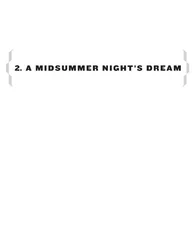The prophet was about her age. Whatever else the prophet had become, he’d once been a boy adrift on the road, and perhaps he’d had the misfortune of remembering everything. Kirsten brushed her hand over the prophet’s face to close his eyes, and placed the folded page from Station Eleven in his hand.
WHEN SAYID AND AUGUST AND KIRSTENwalked away from the bodies on the road, resuming their slow progress to the airport, the prophet’s dog followed at some distance. When they stopped to rest, the dog sat a few yards away, watching them.
“Luli,” Kirsten said. “Luli.” She threw a strip of dried venison, and the dog snapped it out of the air. He came close and let her stroke his head. She ran her fingers through the thick fur at the base of his neck. When they set out again, the dog stayed close by her side.
A half mile farther, the road curved out of the trees, the terminal building massive in the near distance. It was a two-story monolith of concrete and glass, shimmering over an ocean of parking lot. Kirsten knew they were almost certainly being watched by now, but she saw no movement in the landscape. The dog whined and raised his nose in the air.
“Do you smell that?” Sayid asked.
“Someone’s roasting a deer,” August said. The road divided before them, separate lanes for Arrivals, Departures, and Parking. “Which way?”
“Let’s pretend there’s a way to get off this continent.” Sayid had a distant look about him. The last time he’d seen an airport had been two months before the collapse, when he’d returned home from visiting his family in Berlin and landed for the last time at Chicago O’Hare. “Let’s go to Departures.”
The Departures lane rose to a second-story entrance, a line of glass-and-steel revolving doors, a municipal bus glinting in sunlight. They were a hundred yards from the door when the whistle sounded, three short blasts. Two sentries stepped out from behind the bus, a woman and a man, their crossbows aimed at the ground.
“Sorry about the crossbows,” the man said pleasantly, “necessary precaution, I’m afraid—” But he stopped then, confused, because the woman’s bow had clattered to the pavement and she was running to the new arrivals, she was laughing and shouting their names and trying to embrace all of them at once.
There were 320 people living in the Severn City Airport that year, one of the largest settlements Kirsten had seen. August took Sayid to the infirmary, and Kirsten lay dazed in Charlie’s tent.
By the beginning of Year Two the occupants of the airport had been sick of looking at one another but on the other hand they hadn’t wanted to sleep too far apart, so they’d constructed a double line of tents down the length of Concourse B. The tents were of varying sizes, with frames made of branches dragged in from the woods, squares of about twelve feet by twelve feet with peaked roofs. They’d raided the airport offices for staplers, stapled sheets over the frames. There’d been some debate over whether this was the best use of the mountain of sheets they’d salvaged from the nearby hotels, but there was such a longing for privacy by then. In Charlie and Jeremy’s tent there was a bed, two plastic crates for clothes and diapers, their instruments. A watery light filtered through the cloth. Luli crowded in and lay by Kirsten’s side.
“I’m so sorry about Dieter,” Charlie said. “August told me.”
“It doesn’t seem real.” Kirsten wanted to close her eyes, but she was afraid of what she’d dream of if she slept. “Is there a tattooist here, Charlie?”
Charlie brushed her fingertips over Kirsten’s right wrist, the two black knives inked two years apart. “How many?”
“One. An archer on the road.”
“There’s a tattooist who lives in the Lufthansa jet. I’ll introduce you tomorrow.”
Kirsten was watching an ant cross the roof of the tent on the outside, the shadow of its tiny body and the pinpoint impressions of its legs on the fabric. “I’ve been thinking about the nursery,” she said.
A few years ago, they’d been going through a massive country house near the mouth of the St. Clair River, Kirsten and Charlie and August, a place that had been picked over more than once but not for years or maybe a decade, dust everywhere, and eventually August had said something about getting back to the Symphony. Kirsten had gone upstairs in search of Charlie and found her in a room that had obviously been a nursery once, staring at a porcelain tea set sized for dolls. She didn’t look up when Kirsten said her name.
“We should go, Charlie,” she’d said. “We’re a mile from the road.” But Charlie gave no sign of having heard her. “Come on,” Kirsten had said, “we can take it with us,” gesturing to the tea set, which had been set up with improbable precision on a miniature table. Charlie still said nothing. She was staring at the tea set as if in a trance. August called their names from downstairs, and all at once Kirsten had the impression that someone was watching them from a corner of the room, but except for Kirsten and Charlie, the room was empty. Most of the furniture in the nursery was gone, nothing remaining except this little table set for dolls and there, in the corner, a child-size rocking chair. How could this table have remained set, when the rest of the house was ransacked and in disarray? Now that Kirsten looked, she realized there was no dust on the tea set. The only footprints in the dust were hers and Charlie’s, and Charlie wasn’t sitting close enough to the table to touch it. What small hand had placed the doll’s teacups on the table? It was very easy to imagine that the rocking chair was moving, just slightly. Kirsten tried not to look at it. She wrapped the tiny plates and saucers in a pillowcase as quickly as possible while Charlie watched, still not speaking, and then Kirsten stuffed the bundle into Charlie’s bag, took her hand and led her downstairs, out to the overgrown lawn, where Charlie blinked and came back to herself slowly in the late-spring light.
“The nursery was just a strange moment,” Charlie said now, all these years later in her airport tent. “A strange moment in a lifetime of strange moments. I can’t explain what came over me.”
“Is that all? Just a strange moment?”
“We’ve talked about this a hundred times. There was no one else in the room with us.”
“There was no dust on the tea set.”
“Are you asking if I believe in ghosts?”
“I don’t know. Maybe. Yes.”
“Of course not. Imagine how many there’d be.”
“Yes,” Kirsten said, “that’s exactly it.”
“Close your eyes,” Charlie murmured. “I’ll sit here with you. Try to sleep.”
There was music that night, August with Charlie and the sixth guitar. Sayid slept in the infirmary downstairs in Baggage Claim, his injuries cleaned and bandaged. Charlie played the cello with her eyes closed, smiling. Kirsten stood at the back of the crowd. She tried to concentrate on the sound, but music had always unmoored her, and her thoughts drifted. Dieter. The prophet, the only other person she’d ever met who had been in possession of Station Eleven . The archer on the road, her knife in his chest. Dieter as Theseus, A Midsummer Night’s Dream . Dieter brewing his fake coffee in the mornings, Dieter arguing with her about tattoos. Dieter the night she met him in central Ohio, when she was fourteen and Dieter was in his late twenties, half a lifetime ago.
On her first night with the Symphony he’d served her dinner by the fire. She’d been so alone since her brother’s death, and when the Symphony agreed to let her join them it had seemed like the best thing that had ever happened to her, and that first night she’d been almost too excited to eat. She remembered Dieter talking to her about Shakespeare, Shakespeare’s works and family, Shakespeare’s plague-haunted life.
Читать дальше












